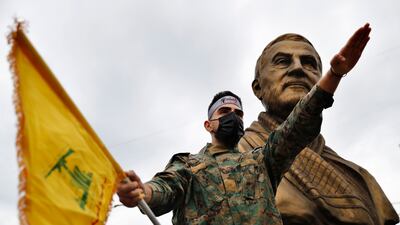Lebanon’s Hezbollah and its ally Amal have agreed to take part in Cabinet sessions after a three-month boycott over the Beirut port blast, Reuters reported on Saturday.
The two powerful Shiite Muslim parties, which back several ministers in the government, made up of members from across the political spectrum, said they would seek to approve the 2022 budget and to discuss economic recovery.
Hezbollah and Amal started boycotting Cabinet sessions on October 12, as part of actions aimed at putting an end to the local investigation into the devastating Beirut port blast of August 4, 2020, which killed at least 215 people and destroyed large parts of the capital.
The political allies have called for the removal of investigative judge Tarek Bitar, whom they accuse of bias.
Several top politicians, including two Amal former finance and public works ministers, have filed lawsuits against Mr Bitar, forcing him on December 23 to pause his probe for the fourth time.
Activists and victims of the explosion regularly accuse Lebanon’s political class, which shares power on a sectarian basis, of trying to avoid accountability. The blast is believed to have been caused by the improper storage for over seven years of hundreds of tonnes of ammonium nitrate.
Many politicians say the probe should be handled by a parliamentary committee and a special court for trying ministers and presidents. Yet this court has not been activated since the end of the 1975-1990 civil war and few believe it will challenge the interests of the country’s ruling class, which is widely accused of corruption and nepotism.
Tension over the probe boiled over on October 14 when seven people died in deadly clashes in Beirut. The violence pitted supporters of a Christian political party, the Lebanese Forces, against members of Hezbollah and Amal along a former civil war frontline.
The failure to hold Cabinet meetings has delayed talks on a recovery plan with the International Monetary Fund, seen as vital to unlocking international support to lift the country out of a crisis that has driven much of the nation into poverty. The local currency hit the record low of 33,000 Lebanese pounds to the dollar last week, triggering anti-government protests.
Prime Minister Najib Mikati, whose post is held by a Sunni Muslim under Lebanon's sectarian political system, said he welcomed the decision to end the boycott and would call for a Cabinet meeting as soon as he received a draft 2022 budget from the Finance Ministry.
The Cabinet is not expected to meet in the coming week as budget preparations are still under way and figures for a financial recovery plan are being drawn up, a government source told Reuters.
An IMF spokesperson said that virtual talks would be held with Lebanese authorities in the last week of January, according to Reuters.
The World Bank has described the country’s financial collapse as one of the worst in the world since the mid-19th century.


